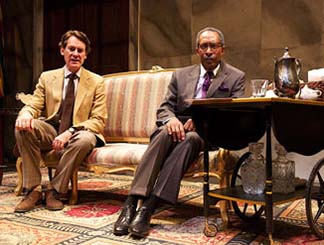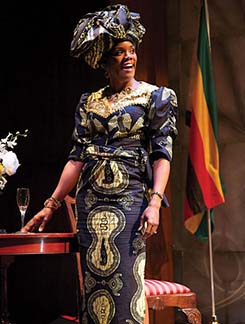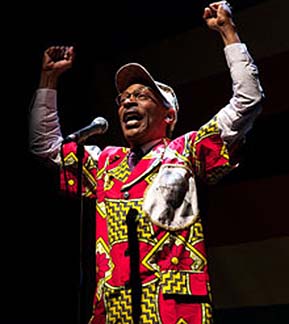By Lucy Komisar
Gripping, disturbing, unsettling, this picture of Robert Mugabe, the despotic president of Zimbabwe, depicts a psychopath who is haunted by the spirit of a man he killed, a fellow fighter in the armed movement of the 1970s to oust the white minority that ruled Rhodesia.
The play was written by British writer Fraser Grace, who was inspired by newspaper accounts that Mugabe, depressed, had sought treatment from a white psychiatrist.

Mugabe (a chilling, sepulchral Michael Rogers) has called Andrew Peric (an earnest Ezra Barnes), who works in the psychiatric unit of Harare Hospital, to help him with some troubles – psychological, emotional, it isn‘t clear.
(In fact, the psychiatrist Mugabe engaged was from Serbia, since he hardly trusted Zimbabweans to hear his inner thoughts.)
Mugabe appears a copy of the whites he deposed. He is dressed in a gray Western suit, has gray hair, a small moustache, glasses. The receiving room is decorated in period French furniture, the kind with claw feet, and an ornate crystal chandelier. An intelligence officer Gabriel (Che Ayende) in gray suit and vest, is a malign presence.
The time is 2001, five months before the 2002 presidential elections. It could just as well be today.
Peric, who appears to be about 40, is a white Zimbabwean whose family several generations before cleared brush to establish the farm he grew up on. The point is that they didn’t throw blacks off the land. And he seems committed to the country, having married a black woman who was an activist and is now a nurse.

Nevertheless, war veterans of the campaign that in 1980 ousted the dominant whites are camped inside the gates of his land.
Peric seems quite earnest and somehow not terribly suspicious of the man who he must know is a mass murderer of his own people. It‘s hard to believe he could be so na¯ve.
Grace Mugabe (the very good Rosalyn Coleman), the president‘s former secretary who maneuvered to become his current wife, is hard and harsh and manipulative and is trying now to get out of Mugabe‘s grip. Decades younger than he, she‘s got the wealth she desired, but now she wants freedom. She tells Peric that the president is behaving strangely. And she wants him to persuade Mugabe to let her go.
Perci discovers that there‘s a malevolent presence in Mugabe‘s consciousness, a fearful ancestor, Ngozi, who is terrorizing him. He is a stand-in for Tongo Gara, who had been involved with Mugabe in intraparty struggles at the time of the first elections. People thought Mugabe would be second in command, but Tongo was killed in a motor accident. Can a psychopath feel guilt, be haunted by the man he had murdered?
The breakfast is the imaginary meal Mugabe has with Tongo. There will be an ironic breakfast for Peric, too, who will discover that having a close relationship with Mugabe is disastrous.

Still, he tries seriously to get Mugabe to think about his problems. Mugabe‘s first wife Suly was an idealist, an activist. Perci tells him he feels guilt toward his first wife for sleeping with Grace. It‘s hard to believe a psychiatrist would talk to Mugabe that way. Most psychiatrists listen and say very little. Peric is the reverse.
The only outcome must be horrific, brutal. It is unnerving to see Mugabe the twisted scoundrel, the demagogue, shouting at a party rally, “Our party must strike fear into the hearts of the white men.” Now Mugabe is dressed in a bright red Africa patterned suit.
Two white Zimbabweans who left the country years ago told me, “We could not stand up at the end of the performance. So visceral, so strong.”
“Breakfast with Mugabe.” Produced by Two Planks and a Passion Productions. Written by Fraser Grace; directed by David Shookhoff. Signature Center, 480 W 42nd St, New York City. Opened Aug 17, closes Oct 6, 2013. 9/27/13. Review on NY Theatre Wire. Revival at Lion Theatre, 410 West 42nd St, New York City, Dec 5 to 21, 2013.


Imagine how blacks persecuted in their own country might feel. Ian Smith was the devil incarnate and England his benefactor. Fact is that Zimbabwe belongs to the people who were there first, and no matter how much bush you cleared, you were an uninvited guest who has been shown the door. Take the exit.
Would England allow a small group of Africans to come and take over their land, clear the castles and set up residence? I think not. The unfortunate thing is that Whites always cry fowl when they are asked to give back what they stole from someone else.
Similarly here in the U.S. native Americans are given the worst piece of land, and now that they have learned the way to take back what belongs to them, we hear a lot of disgruntled settlers getting their feelings hurt.
Call him what you will he has taken Zimbabwe back for Black Zimbabweans, he may not be perfect – but name me what politicians in Europe or the US that is.